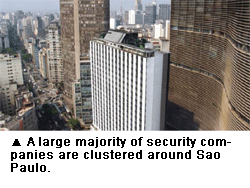After several years of fiscal struggle and infrastructure development, Brazil has emerged as one of the most rapidly growing and attractive business environments in the world. The leading industry associations in Brazil and in the U.S. give us the lowdown on South America's biggest market.
After several years of fiscal struggle and infrastructure development, Brazil has emerged as one of the most rapidly growing and attractive business environments in the world. The leading industry associations in Brazil and in the U.S. give us the lowdown on South America's biggest market.
Since 1994, Brazil's economy has gradually stabilized under the Plan Real, with guidance from the World Bank and the International Monetary Fund. In addition, the energy and telecommunications industries have been deregulated, leading to explosive growth in these and other industries. International demand for raw materials has helped boost investments in infrastructure; and the PAC (Accelerated Development Plan), sponsored by the Brazilian government, promises significant investments that will bring great opportunities to the security industry. There is abundant opportunity in the Brazilian market for electronic security companies.
The Brazilian economy increased at a sustainable 5.4 percent in 2007 to US$1.1 trillion, making it Latin America's largest economy. GDP growth is expected to slow to 4.8 percent in 2008, which is still a healthy, yet sustainable rate. This growth and Brazil's stability have attracted new foreign direct investment (FDI) to Brazil, which has nearly doubled from 2006 to 2007, from $18.7 billion to more than $34 billion. According to a November 2007 survey conducted by InfoAmericas on 50 U.S. multinational companies operating in Latin America, strategic planning managers cited Brazil as the top market of interest for new investment in 2008. FDI is expected to increase by 9.5 percent per year in 2008 and 2009.
Profitable opportunities for security companies in the Brazilian market are concentrated in major infrastructure development projects such as oil and gas, urban surveillance, intelligent transportation systems, and world-class events such as the 2014 World Cup finals. "Security businesses can reach these markets by attending trade shows such as ISC Brazil the show of choice for companies that offer sophisticated security solutions for major projects," said Pedro Duarte, President of Latin American Marketing for GE Security.
Since 1995, in an effort to encourage foreign investment, foreign investors and  foreign capital have been considered equal to Brazil's. Industries such as telecommunications, mining, transportation, and petroleum have been opened to foreign investors. Foreign nationals are permitted to purchase land in
foreign capital have been considered equal to Brazil's. Industries such as telecommunications, mining, transportation, and petroleum have been opened to foreign investors. Foreign nationals are permitted to purchase land in
Brazil. (Land purchases near the borders require special registration.) However, foreign investors are required to register with the Brazilian Central Bank within 30 days of their initial investment and investments involving royalties and technology transfer must be registered with the National Institute of Industry Property.
The electronic security industry has also benefited from the influx of FDI as foreign companies such as Honeywell, Siemens, Johnson Controls, and HID Global claim notable shares of the market for electronic security in Brazil. In fact, multinational companies have a greater presence than local ones, as electronic security equipment requires technologically advanced components typically not manufactured in Brazil.
Where to Focus One's Efforts
With a current cumulative average growth rate estimated at 16.2 percent through 2012, the demand for electronic physical security products is growing at more than twice the rate of GDP. The rapid growth of the electronic security market in Brazil has led to a highly complex and fragmented value chain, with a large number of participants. There are currently over 100 equipment manufacturers and a wide range of distributors and integrators.
According to the latest study from the Brazilian Electrical and Electronics Industry Association (ABINEE), sales of products related to electronic security in 2006 were above $200 million and systems integration products and services were above $900 million. Although the commercial sector uses electronic security at a greater rate than the residential sector, increased household consumption due to job growth is one of the key factors driving the increase in security demand. Household consumption drives not only demand for residential security, but also demand for security in the retail and banking sectors as consumers are increasingly able to open bank accounts, obtain credit, and shop.
Since 2001, Brazil has experienced a rapid increase in the establishment and growth of financial institutions and in the consumer banking system. The new sophistication of the banking industry has also helped to stabilize the economy. However, the surge in global oil prices has pushed up fertilizer costs and has been among the main causes for an increase in food price inflation. Consumer prices in Brazil rose at the fastest pace in more than three years in the first half of 2008 as the cost of rice, meat and other staple food items rose sharply. Brazilˇs central bank is following the lead of the U.S. Federal Reserve Bank in attempting to control inflation through managing interest rates. Brazilˇs central bank raised its benchmark Selic lending rate three times this year to curb resurgent inflation and prevent the economy from overheating.
The modern banking industry has proven to be one of the major drivers for electronic security market growth. There are vast opportunities for security businesses in the banking sector. Brazilian banks are increasingly investing in business solutions, which include: digitization of documents, business intelligence solutions, digital certificates used for e-commerce, VoIP, enhanced security, electronic fraud prevention, ATMs, and applications developed on open source technology platforms such as Linux.
The use of debit cards accounted for 28 percent of the total transaction volume in 2006. In Brazil, these cards are rapidly migrating from magnetic strip cards to chip-enabled cards under the Europay, Mastercard, Visa (EMV) protocol. EMV-compatible terminals have caused fraud rates to decrease by more than 80 percent since the start of the migration process in 1999. The same cards are used at ATMs, which are monitored by video surveillance systems providing an increased market for this technology. The retail segment is also investing in automation, management, and logistics, adopting smart cards for both in-store and Internet shopping.
 The expansion of credit can only increase the market volume of the Brazilian electronic security market, which reached $214.8 million in 2006 and is expected to grow to $530 million by 2012. The market for electronic security is forecast to grow at a compound annual growth rate (CAGR) of 16.2 percent through 2012. By 2012, the residential market is expected to account for 16.4 percent of the total market. By the same year, the proportions of the market held by various technologies are expected to be:
The expansion of credit can only increase the market volume of the Brazilian electronic security market, which reached $214.8 million in 2006 and is expected to grow to $530 million by 2012. The market for electronic security is forecast to grow at a compound annual growth rate (CAGR) of 16.2 percent through 2012. By 2012, the residential market is expected to account for 16.4 percent of the total market. By the same year, the proportions of the market held by various technologies are expected to be:
alarms 15.7 percent;
fire detection and monitoring systems 5.8 percent;
video surveillance systems 41.9 percent;
electronic article surveillance (EAS) 9.7 percent;
physical access control systems 26.9 percent.
It is expected that local and international electronic security companies will continue to target the commercial and industrial market segments in the short and medium terms, changing focus to the residential and service sectors in the medium and longer term. Development of affordable integrated security solutions that include a high level of customer service is recommended, including specialized technical support in the local language. This service-oriented strategy will not only secure customer satisfaction and loyalty, but also provide ongoing revenue opportunities.
Complete security solutions with combined applications such as EAS, alarms, video surveillance, and access control is also a recommended success strategy that can be established through strategic partnerships with local companies. It is predicted that more foreign entrants will partner and form joint ventures with local companies along the entire value chain. Partnerships with local companies will not only facilitate the ability to provide reliable and integrated solutions customized to clients' requirements, but also gives foreign companies tax advantages.